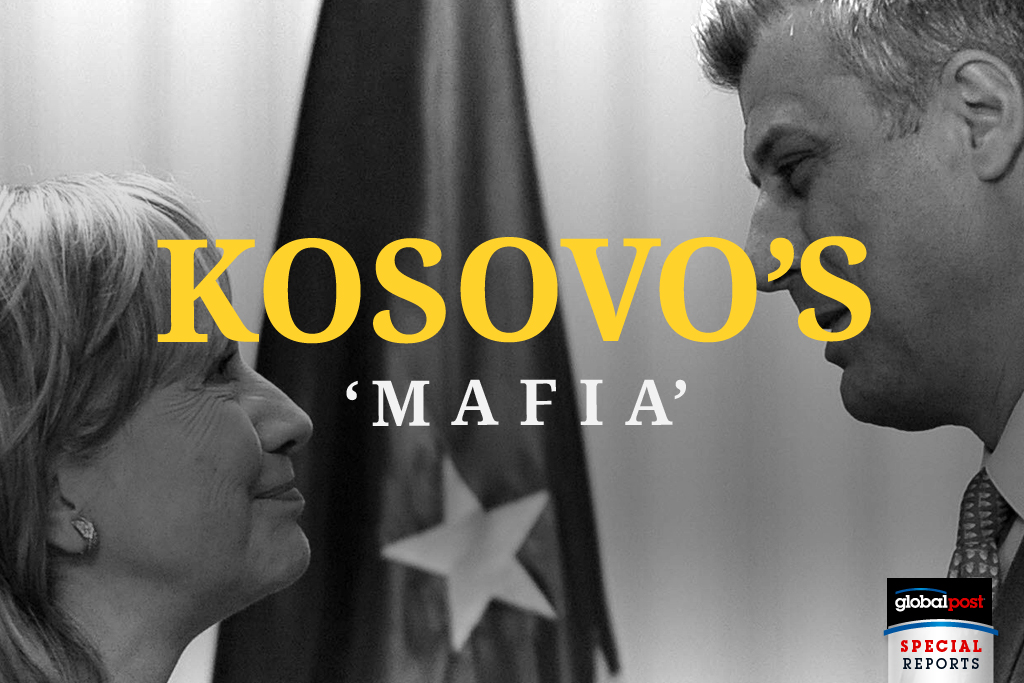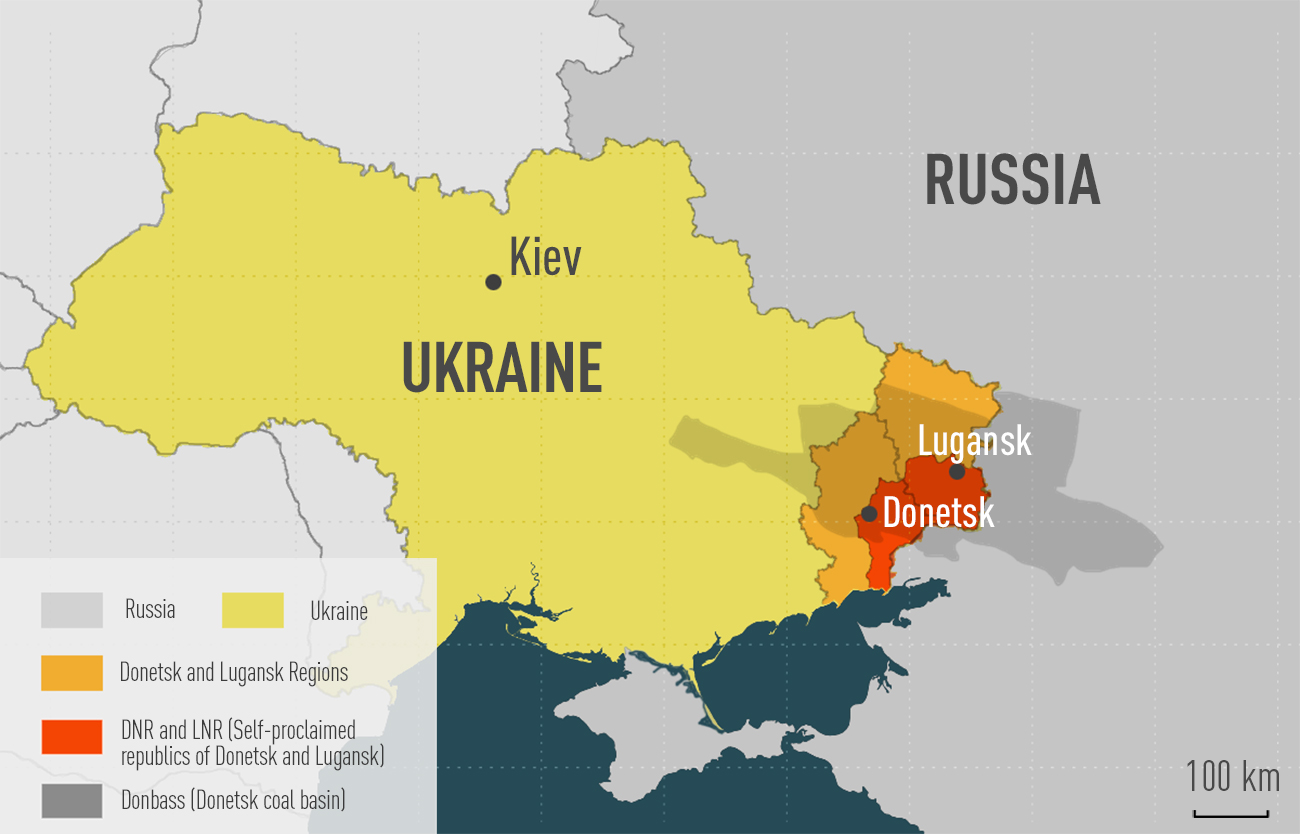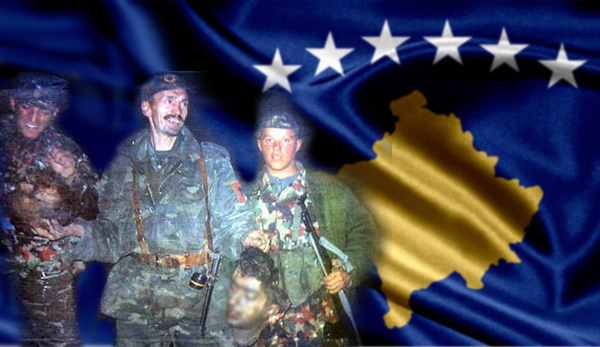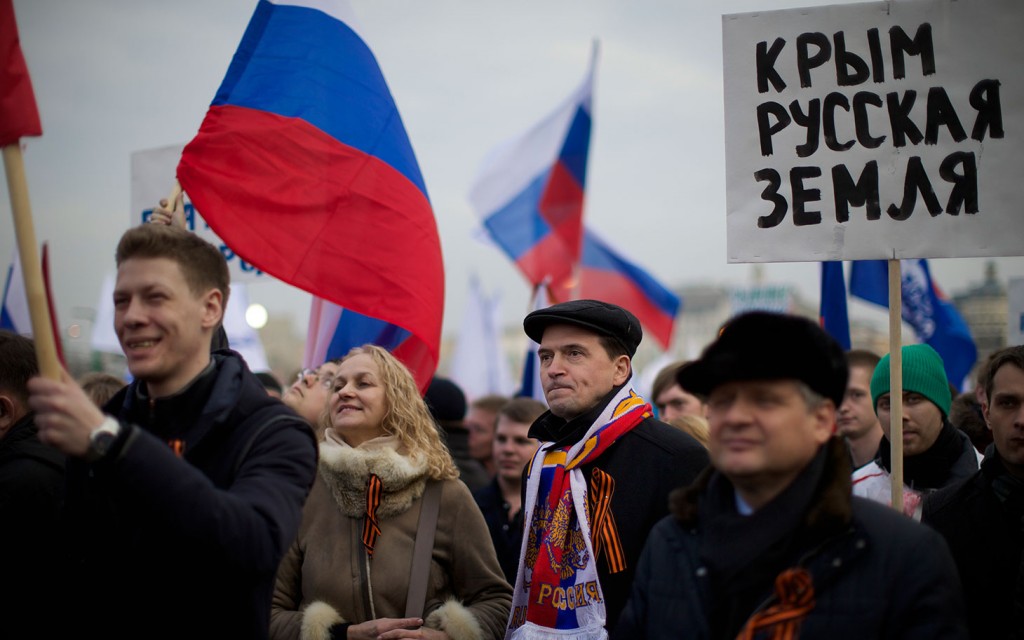
Views: 4072
The only discussion of principle emerging from the debates over Kosovar and Crimean independence is that initiated by Woodrow Wilson towards the end of World War One, about whether national minorities have the right to self-determination. Can a smaller group be compelled to be part of a larger state, or should they be permitted to secede? To what extent do minority rights amount to a freedom to determine one’s own sovereignty?
 In June 1999 an international military force led by the United States annexed Kosovo, then a province in southern Serbia with a population of perhaps 1.6 million people. Virtually all Serbian government administrators of the province fled. This took place after a NATO military campaign intended to degrade Serbia’s military and government facilities, in the course of which between 5,000 and 15,000 people are thought to have died and a further half a million to a million people became refugees. By any measure, events in Kosovo in 1999 were a humanitarian catastrophe. The result was that the region’s government was separated entirely from that of Serbia. Initially it was subject to a regime of international administration under the auspices of the United Nations. By 2005 it had its own autonomous domestic government; by 2008 Kosovo had unilaterally declared independence from Serbia. At the time of writing, 104 countries (more than half the members of the United Nations) recognise Kosovo as an independent state.
In June 1999 an international military force led by the United States annexed Kosovo, then a province in southern Serbia with a population of perhaps 1.6 million people. Virtually all Serbian government administrators of the province fled. This took place after a NATO military campaign intended to degrade Serbia’s military and government facilities, in the course of which between 5,000 and 15,000 people are thought to have died and a further half a million to a million people became refugees. By any measure, events in Kosovo in 1999 were a humanitarian catastrophe. The result was that the region’s government was separated entirely from that of Serbia. Initially it was subject to a regime of international administration under the auspices of the United Nations. By 2005 it had its own autonomous domestic government; by 2008 Kosovo had unilaterally declared independence from Serbia. At the time of writing, 104 countries (more than half the members of the United Nations) recognise Kosovo as an independent state.
In February 2014, Ukraine’s unicameral parliament voted to remove the country’s elected President, Viktor Yanukovych, from power, declaring that he had resigned. The Yanukovych government, perceived by many ethnic Ukrainians as pro-Russian, was replaced by a western-leaning administration and early elections were scheduled. Three days later unidentified gunmen occupied government buildings in Simferopol, the capital of the autonomous Ukrainian province of Crimea with a population of some 2.35 million. Irregular militias established checkpoints on the borders with the rest of Ukraine. The Crimean Parliament dissolved the province’s local government. Russian troops were subsequently acknowledged as present in Crimea in substantial numbers. A pro-Russian replacement government organised a referendum in March, the results of which were overwhelmingly in favour of independence. Crimea then made a unilateral declaration of independence from Ukraine and applied to join the Russian Federation. Russia agreed, enacting legislation absorbing Crimea into its federal institutions. Very few people died. No third country recognised Crimea’s independence, but they did not need to. Crimea did not aspire to become an independent state; it aspired to, and has succeeded in, joining another state. Crimea has since adopted Russia’s currency, western time zone, government structures and social welfare system. Its legislative structure is being similarly overhauled.
It is superficially tempting to compare these two extraordinary events of territorial self-determination through the lens of legal principle. Western narrative avers that Kosovo’s independence was legitimate as a matter of international law and diplomatic policy, whereas the annexation of Crimea was an act of illegitimate aggression by an insurgent Russian power. The two events had different origins, although both events were precipitated by different types of political crisis. The international annexation of Kosovo was the product of a low-level war of insurgency between the Serbian army and a developed but irregular Kosovo militia, the Kosovo Liberation Army, that had begun in February 1998. NATO intervened (initially without a UN Security Council mandate), so it said, to prevent bloodshed. Nevertheless NATO military action caused substantial loss of life, so at least some sort of utilitarian calculus (between lives saved and deaths caused) is surely necessary to evaluate the merits of what was done.
By contrast the annexation of Crimea was not precipitated by loss of life and caused almost no loss of life. The counting of lives cannot therefore be an appropriate method of evaluating the propriety of what Russia did; one must therefore appeal to some other principle to reach a conclusion about whether Russia’s actions were right or wrong. The most natural such set of axioms might appear to be those of international law. The argument run that Russia interfered in another country’s sovereign territory, and states should not do this. But legal arguments of this kind assume the inviolability of international borders. And Kosovo was the principal instance since the end of the Cold War where the international community has seen fit to abandon that notion. It did so even though the United Nations Security Council insisted that Kosovo remain part of Serbia after the end of the war there. With western support, the province declared independence nonetheless and three out of the five permanent members of the UN Security Council recognised its right to do so. If Kosovo can achieve such a feat over the strictures of the UN Security Council, why can Crimea not do the same where the Security Council has made no such pronouncement? No obvious answer of principle presents itself.
The issue was aired before the International Court of Justice (ICJ) in its advisory opinion on Kosovo’s independence, delivered in 2010. That opinion asserted that Kosovo’s declaration of independence was consistent with international law, but the reasons provided were obscure. The Court’s logic was that declarations of independence are never unlawful as a matter of international law. Indeed it does not matter how the declaration of independence comes about: that is a matter for the domestic law of the state, or aspirational state, in question. Even a powerful obstacle of principle to applying this analysis to Kosovo was intricately obviated. The Kosovo Assembly, issuing the declaration of independence, was a creation of the United Nations governance mission. The United Nations Security Council had issued a resolution prohibiting Kosovo’s independence. How could a UN organ overrule the UN Security Council? The answer the Court divined was that the Kosovo Assembly was not acting in its official role, but rather as a representative of the will of the people of Kosovo. Therefore it was free to disregard Security Council resolutions.
But the Court’s rationale in the Kosovo case lends itself even more forcefully to Crimea. In Crimea there was no Security Council resolution against independence, because Russia would have vetoed one. The internal procedure by which Crimean independence came about – a popular referendum, arguably harbouring more institutional legitimacy than the vote of a legislative assembly created by the United Nations – is irrelevant for the purposes of international law. By the reasoning of the Court, all that matters is the occurrence of a procedure which led to a declaration of independence. Therefore if Kosovo can declare independence, there is surely no reason why Crimea cannot do so as well.
One reaction to all this is simply to observe that the Court’s reasoning about Kosovo’s declaration of independence was wholly bogus and should not stand as a legal precedent of any kind. It was the product of the Court being stacked with pro-western Judges whose countries of origin had already recognised Kosovo’s independence. The Judges therefore lent their names to a legal opinion consisting of unprincipled scrap, in the interests of political expediency.
A principled jurist might however try harder than the Judges did, and attempt to divine some genuine legal principles from the Kosovo case and then enquire whether those principles lead to a different outcome for Crimea.
The argument of principle, at its most forceful, would be this. The majority of the population of Kosovo – its Albanian majority – wanted independence. They had been fighting a low-level insurgency for a number of years with a view to obtaining that goal. In the weeks and months before the NATO bombing began, the Albanian insurgency had been met with a Serb military crackdown in which at least several hundreds of people – Kosovar Albanians said the numbers were many more – had died. The extent of the violence meted out to the Albanian insurgents caused Serbia to forfeit its right to exercise sovereignty over the province: internal Serbian violence necessitated international intervention for humanitarian goals, which in turn entailed eventual independence. Once the province had been separated from the institutions of central government, it could not be returned.
But this argument involves a series of political judgments outside the realm of international law or even moral principle. It requires an assessment of the relative moral culpability of the violence instigated by Serbs and that by Albanians, and possibly even a judgment about relative collective guilt. The argument entails a conclusion that international military intervention was warranted in another country’s conflict to achieve humanitarian goals. It then entails a political judgment that independence was the best option facing the international community once it had occupied Kosovo.
None of these are matters upon which legal principles can sensibly declare. They require multi-faceted value judgments in the field of international relations. At its heart, the case for Kosovo’s independence was that given the corner into which the international community had isolated itself in 2008, Kosovar independence was the least bad outcome. Negotiations between Serbia and the Kosovar Albanians over the final status of the province had achieved nothing. The international community could not abandon the province it had occupied using military force, or the insurgency in which it had acted to intervene would surely have resumed. Had the United Nations sought to reintegrate Kosovo back into Serbia, this would have resulted in an Albanian insurgency against its own forces. UN occupation of the province had resulted in de facto independence from Serbia, and this was a trend it was impossible to reverse. But none of these are matters it is sensible to expect Judges impartially to pronounce upon. Each step in this chain of reasoning involves assessments born of political expediency and not of principle.
 Hence any attempt to establish legal principles upon which an assessment of a province’s declaration of independence may or may not be justified is surely a mirage. The ICJ’s Kosovo decision established the principle that the internal constitution of a country is no obstacle to a declaration of independence being lawful. (Serbia’s constitution prohibited Kosovo’s independence.) Indeed the ICJ did not consider the line of reasoning based upon political expediency at all, and hence its ruling was rendered bereft of all comprehensible logic. The rationale for Kosovo’s independence was not one of principle but of convenience to the interested occupying powers. This conclusion seems inescapable, or the ICJ – whose Judges are to be assumed competent and gifted – would surely have done a better job in attempting to rationalise what took place. But in that case, the same metric of political expediency falls to be applied to Crimea’s independence. It was convenient and appropriate to Russia that she facilitate the province’s independence and joinder to the Russian Federation, in light of unattractive events in a neighbouring country. Any argument against this analysis may be premised only upon the value-laden judgments involved in international politics, and not upon the supposedly objective parameters of international law.
Hence any attempt to establish legal principles upon which an assessment of a province’s declaration of independence may or may not be justified is surely a mirage. The ICJ’s Kosovo decision established the principle that the internal constitution of a country is no obstacle to a declaration of independence being lawful. (Serbia’s constitution prohibited Kosovo’s independence.) Indeed the ICJ did not consider the line of reasoning based upon political expediency at all, and hence its ruling was rendered bereft of all comprehensible logic. The rationale for Kosovo’s independence was not one of principle but of convenience to the interested occupying powers. This conclusion seems inescapable, or the ICJ – whose Judges are to be assumed competent and gifted – would surely have done a better job in attempting to rationalise what took place. But in that case, the same metric of political expediency falls to be applied to Crimea’s independence. It was convenient and appropriate to Russia that she facilitate the province’s independence and joinder to the Russian Federation, in light of unattractive events in a neighbouring country. Any argument against this analysis may be premised only upon the value-laden judgments involved in international politics, and not upon the supposedly objective parameters of international law.
At the current time it is hard to portray a politically neutral narrative of the turmoil in Ukraine in 2014, as events are too recent and hence the politics of media partiality colours too thoroughly any attempt at verifiable historical analysis. Nevertheless the basic course of events is something like the following. In November 2013 the then-Ukrainian President repudiated an agreement for closer economic ties with the European Union after years of negotiations, in favour of a substitute subsidised energy deal with Russia. European and American governments then funded a revolutionary movement that led to his overthrow before the expiry of his electoral term, and he fled the country. The government in Kiev was replaced with a pro-western interim administration. Russia was fearful of Ukraine falling into a western orbit, and in particular joining her military rival NATO or developing economic ties with the European Union to the exclusion of Russian influence. To preclude this, Russia orchestrated a peaceful uprising in the ethnically and historically Russian province of Crimea, which houses the Russian Black Sea fleet. This took place with the consent of the overwhelming majority of Crimean residents.
Measured by the criterion of popular will, Crimea’s independence from Ukraine was every bit as proper as that of Kosovo: 90% or more of the population of both provinces supported their respective acts of independence. Russia’s actions in annexing Crimea were less harmful than those of NATO in annexing Kosovo: only one person is recorded as having died. The political events that led to the act of annexation in each case were different: insurgency and crackdown, versus overthrow of a democratically elected government. Nevertheless it is hard to say, as a matter of political pragmatism, that one of these two measures justifies military intervention in a foreign state less than does the other. In neither case did the internal constitutions of the states from which secession took place permit the acts of secession. But that in itself seemed of scant relevance in either case. Larger countries seldom acquiesce when their smaller provinces secede. (Scotland’s forthcoming referendum on independence from the United Kingdom may become a notable counterexample.)
The conclusion of this discussion is surely that international law has nothing much of value to say about international borders. The only discussion of principle emerging from the debates over Kosovar and Crimean independence is that initiated by Woodrow Wilson towards the end of World War One, about whether national minorities have the right to self-determination. Can a smaller group be compelled to be part of a larger state, or should they be permitted to secede? To what extent do minority rights amount to a freedom to determine one’s own sovereignty? Wilson was of the view that as a matter of international law, minority groups have a right of self-determination. This seems to entail that provinces dominated by an ethnic minority can declare independence from larger states of which they unwillingly form part.
 But this notion has ebbed and flowed amidst the tides of international relations, and has never been consistently accepted. If it is intended to be a general principle of international law, it has consequences for the future of a number of minority regions as far apart as Xinjiang, Catalonia, South Ossetia and Nagorno-Karabakh, that the international community might be reluctant to embrace. If international law cannot even coalesce a consensus around this relatively straightforward principle, it is not certain that it can say anything intelligent about secession and the emergence of new states at all. If that is right then the difference between Kosovo and Crimea is precisely nothing, save one of political expediency; and the colour of that lens depends upon which direction one may be looking through it. Viewed from the west, Kosovo is most expedient whereas Crimea is not. When one gazes through the eastern corner of the same lens, reflections may be reversed.
But this notion has ebbed and flowed amidst the tides of international relations, and has never been consistently accepted. If it is intended to be a general principle of international law, it has consequences for the future of a number of minority regions as far apart as Xinjiang, Catalonia, South Ossetia and Nagorno-Karabakh, that the international community might be reluctant to embrace. If international law cannot even coalesce a consensus around this relatively straightforward principle, it is not certain that it can say anything intelligent about secession and the emergence of new states at all. If that is right then the difference between Kosovo and Crimea is precisely nothing, save one of political expediency; and the colour of that lens depends upon which direction one may be looking through it. Viewed from the west, Kosovo is most expedient whereas Crimea is not. When one gazes through the eastern corner of the same lens, reflections may be reversed.
Originally published on 2014-06-02
About the author: Matthew Parish is an international lawyer based in Geneva and a frequent writer on international law and international relations. In 2013 he was elected a Young Global Leader of the World Economic Forum and named by Bilan magazine as one of the three hundred most influential people in Switzerland. His third book, Ethnic Civil War and the Promise of Law, will be published later this year. For more information, please visit: www.matthewparish.com.
Source: TransConflict
Origins of images: Facebook, Twitter, Wikimedia, Wikipedia, Flickr, Google, Imageinjection & Pinterest.
Read our Disclaimer/Legal Statement!
Donate to Support Us
We would like to ask you to consider a small donation to help our team keep working. We accept no advertising and rely only on you, our readers, to keep us digging the truth on history, global politics and international relations.
Origins of images: Facebook, Twitter, Wikimedia, Wikipedia, Flickr, Google, Imageinjection & Pinterest.
Read our Disclaimer/Legal Statement!
Donate to Support Us
We would like to ask you to consider a small donation to help our team keep working. We accept no advertising and rely only on you, our readers, to keep us digging the truth on history, global politics and international relations.
FOLLOW US ON OUR SOCIAL PLATFORMS









